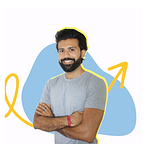An “Ideal Education”
Sadly, one of my heroes, Sir Ken Robinson recently passed away. He was arguably the most prominent educator in the west — having advised multiple countries, and has written several timeless books. However, he is probably best known for having the most-watched TED talk of all time.
In homage to him, I listened to an epic 2-hour conversation he had with Sadhguru. I’d like to share some of his insights.
It’s a fascinating meeting of minds from the East and West. Here are my shortened notes.
🧠 Education should aim to develop the human body and mind to it’s the fullest potential. Most importantly, it should do this without attachment to a particular outcome.
💡 Curiosity is the engine of achievement.
🔦 You cultivate curiosity by letting children deeply explore their own questions. The teacher or parent can give them tools and techniques that help.
👣 Children are naturally inquisitive about the world.
🏃♀️ There is a mad rush for everyone’s kids to be better than everyone else. This is a disease. Each child will unfold in a unique way.
🇫🇮 The Finnish Education system is the best in the world. They have a culture of collaboration, not competition.
👯♀️ Currently, we think, “how can I perform better than my peer?”. But the question from a young age could be, “how can we combine our individual strengths to work together and build better solutions?”
🌱 Invest in understanding a child’s inner world. Not just telling them about the outer world.
🎓 Take 2 kids with the exact same upbringing and they can turn out completely differently. That’s because we can’t control how they perceive the world. However, we can train ‘awareness’ (identifying and describing their experience of the world).
⏱️ Learning doesn’t stop because it’s the end of the school day or a weekend. It’s 24/7.
🦉 We have too narrow a definition of what it means to be ‘Intelligent’.
🎸 Sir Paul McCartney hated Music in school.
🎤 In Liverpool, in the 1950s a Music teacher had both Sir Paul McCartney and George Harrison (half of The Beatles!) in his classes. He didn’t think they were particularly talented.
📜 Academic ability is not the same as intelligence. It’s just a proxy.
❓Our current education system rewards memory. But memory and intelligence are different things.
🧑🏽🏫 The best people don’t go into teaching as the economic incentives are misaligned. E.g. name me a famous teacher?
🌐 Education has become an issue of global competitiveness. As a country we choose to compete with the USA and Asia. Especially in ‘STEM’ subjects. The children are the foot soldiers in this battle. But it’s a conscious choice if you as a parent want to play that game or not.
📝 Standardised assessment is a business and generates £billions of profit for their publisher owners.
🎵 Music is not something to learn in a silo. It has always been used to help make connections and add creativity to other formal pursuits. Einstein had his violin. Marie Curie had her piano. And Feynman had his bongos!
➗ We could get rid of this idea of “subjects” in schools. It is centred around academic research, which is organised in single disciplines. However, the world is more connected and complex and requires more people to think interdisciplinary.
🌍 Education that was fit for a world as recently as the year 2000 is very different from now. Population growth has been rapid over the past 50 years. Numbers:
1930: 2bn people
1970: 3.5bn people
2000: 6bn people
2023: >8bn people.
🌲 Plant analogy. We worry so much about how the plant (child) will turn out. But our job should just be cultivating the best soil and letting things unfold.
This is a shortened list of my full notes that I sent out to subscribers. I’m currently doing my PGCE at Oxford University and working at a nearby secondary school, teaching Mathematics. I comment on themes from Education & Learning, and how they might benefit you, and the next generation.
